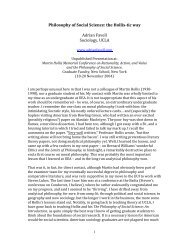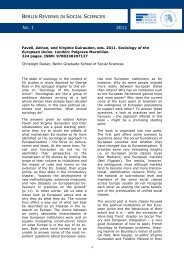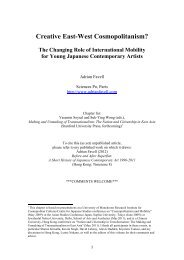Governmentality, political field or public sphere ... - Adrian Favell
Governmentality, political field or public sphere ... - Adrian Favell
Governmentality, political field or public sphere ... - Adrian Favell
Create successful ePaper yourself
Turn your PDF publications into a flip-book with our unique Google optimized e-Paper software.
506 European Journal of Social The<strong>or</strong>y 14(4)to different findings on the descriptive level. The most hostile critics charge that <strong>public</strong><strong>sphere</strong> research often tends to be the ‘victim’ of a n<strong>or</strong>mative definition of the European<strong>public</strong> <strong>sphere</strong> too much inspired by the European institutions’ own conceptions, whileneglecting the hist<strong>or</strong>ical and institutional processes that promoted EU inf<strong>or</strong>mation andEuropean <strong>public</strong> opinion as central aspects of the EU (Baisnée, 2007b). From aBourdieusian point of view, the <strong>public</strong> <strong>sphere</strong> perspective only grasps a very small partof the EU as a novel <strong>political</strong> environment, because so much of what is interesting in theEU takes place well beyond the eye of national media (<strong>Favell</strong>, 2006: 128).DiscussionAs we have shown, Foucauldian, Bourdieusian and Habermasian approaches to thedemocratic deficit each bring new elements to the mainstream debate. By themselves,adopting any one of them offers a potentially transf<strong>or</strong>mative vision of typical questionsabout democratic legitimacy in the EU, that changes the object of study and/<strong>or</strong> offersnew methodologies f<strong>or</strong> expl<strong>or</strong>ing issues central to the <strong>field</strong>. The presence of this substantialand growing set of literatures ought to be enough to fuel a sociological rethinking ofsome of the mainstream’s conventional <strong>political</strong> science rooted assumptions and conceptions.However, as we have also seen, each approach is marred by particular weaknesses,that may also be bound up with why they can so easily be ign<strong>or</strong>ed. Our strategy so far hasbeen to reveal the strengths and weaknesses by juxtaposing the three approaches. Wenow aim to conclude with a m<strong>or</strong>e synthetic strategy.Clearly, we think much m<strong>or</strong>e can be done at the level of empirical operationalizationthan in terms of conceptual meta-the<strong>or</strong>y <strong>or</strong> philosophical debate. At a purely the<strong>or</strong>eticallevel, there is most likely no reconciliation possible. Within each of the distinctive‘sociologies’ that their legacies lay down, the three paradigms speak different conceptuallanguages, and take different philosophical stances on how to do social the<strong>or</strong>etical and/<strong>or</strong>scientific w<strong>or</strong>k. Habermasians are clearly ‘n<strong>or</strong>mative’ in their liberal faith in <strong>public</strong>ityand the search f<strong>or</strong> truth through communication; the idea of the ‘<strong>public</strong> <strong>sphere</strong>’ hasbecome one which most scholars in this line seek to use to build a ‘better Europe’ bydiagnosing the failings of the present. Yet when operationalized, some of the mosteffective examples of <strong>public</strong> <strong>sphere</strong> research (Wessler et al.2008; Koopmans andStatham, 2010) in fact take a strongly ‘positivist’ style, that has been concerned toprovide extensive empirical evidence to assess certain basic ideas. In these applications,some of the potential of redefinitional critique is sacrificed f<strong>or</strong> the sake of empiricalclarity and engagement with mainstream questions. Bourdieusians, in their contrary way,tend to both emphatically reject naive ‘empiriste’ positivist w<strong>or</strong>k of this kind while alsodespising the ‘easy’ post-modern/constructivist moves of m<strong>or</strong>e Anglo-American readingsof French social the<strong>or</strong>y. Loïc Wacquant’s definitive guide to Bourdieu’s w<strong>or</strong>k(Bourdieu and Wacquant, 2002), f<strong>or</strong> example, offers the clearest statement of howBourdieusian sociology seeks to square the sterile circle opposing ‘social physics’ with‘social phenomenology’, in a kind of ‘post-post-positivist’ empirical w<strong>or</strong>k. The impressivebody of empirical studies amassed by both Bourdieu and his followers attests to therichness of this sociology. Unf<strong>or</strong>tunately, though, the cult of Bourdieu and the exclusivitydemanded by the adoption of his rigid terminology tend to cut sh<strong>or</strong>t many





